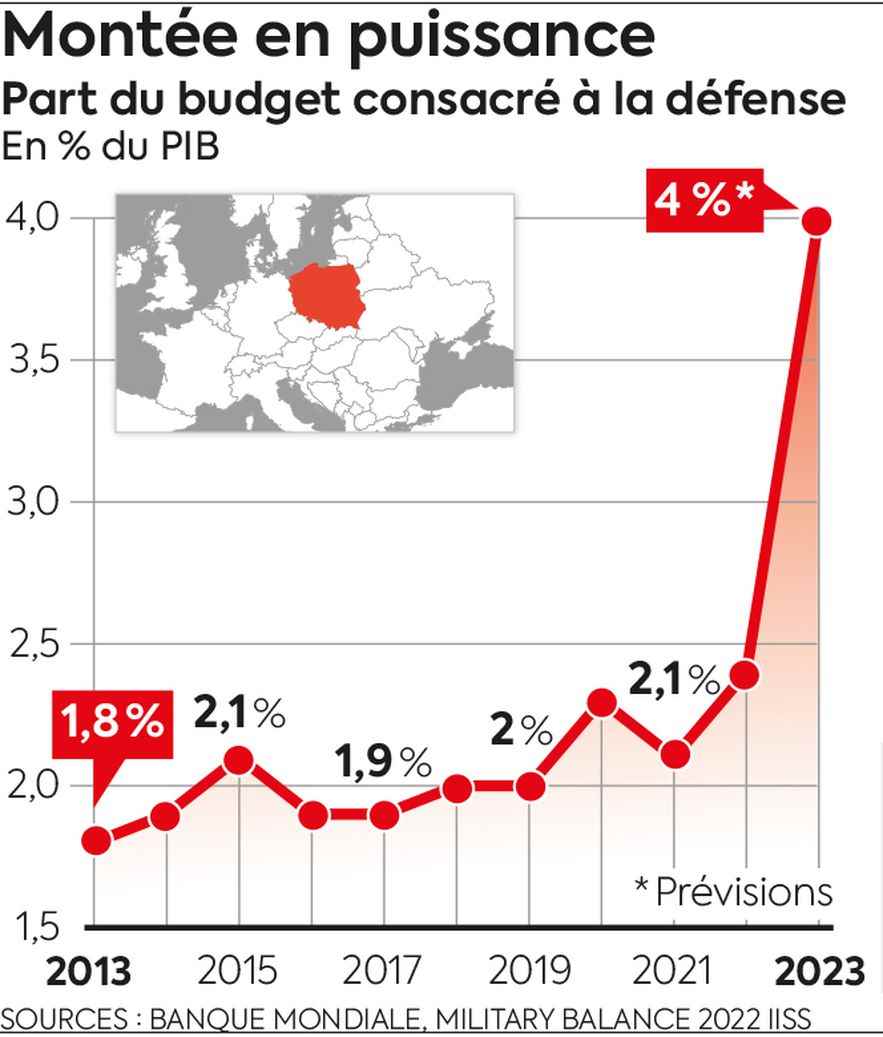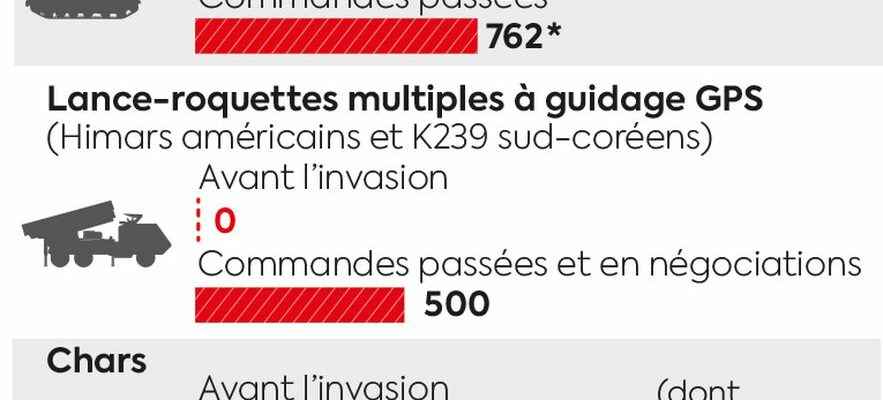A very special kind of school opened its doors last summer in Biedrusko, a village in western Poland. As its name suggests, the Abrams Tank Training Academy, installed on a military base whose field of maneuvers is the size of Paris, familiarizes Polish crews and mechanics with the delicate handling of the M1 Abrams tank and its sixty tons of steel. Under the leadership of instructors who arrived from the United States with 28 examples, tankers in training have been doing piloting and firing sessions there for several months, with one of the most advanced armored vehicles in the world.
The academy has a bright future ahead of it: after signing a contract with Washington in the spring for 250 tanks, Warsaw increased its total purchase of Abrams in early January: it will be 316. adds an order for a thousand South Korean K2 tanks, of which 820 will be manufactured on Polish soil from 2026. In a few years, Poland should thus have seven times more tanks than France and have, like the announced its Defense Minister, Mariusz Blaszczak, of “the most powerful land forces in Europe”.
The invasion of Ukraine reinforced his conviction: to dissuade Russia from attacking, or to resist it, it must transform itself into a military giant. And therefore multiply the contracts. To South Korea, in addition to the K2s, it placed orders for 672 K9 self-propelled guns, 50 FA-50 combat aircraft and 288 K239 multiple rocket launchers. They complement those concluded with the United States: latest-generation F-35 fighters, Himars and Patriot anti-missile systems. Warsaw’s military spending should represent 4% of its GDP this year, the level “the highest among all NATO countries”, welcomed Prime Minister Mateusz Morawiecki.
3736_Poland_armament
© / Art Press
In Poland, the fear of being the next target
In the eyes of the Poles, time is running out: if the Ukraine falls, they could be the next target of a Russia with a lively imperialism, which has already invaded their country in the time of the tsars, as under Stalin. Their geography lends itself to this, and not only because it has a direct border with the enclave of Kaliningrad and another with Belarus, where the Kremlin already has troops. “It’s a country of plains, without mountains to protect it, so the Poles want to be able to rely on a powerful land force, with thousands of armored vehicles, notes General Ben Hodges, former commander of the US Army in Europe. In the event of a Russian offensive, it would absorb much of the initial attack and buy the rest of Europe time to organize its military response and avert disaster.”
The rise in power also concerns its military personnel. By 2035, the government wants to double them, to bring them to 300,000. But this objective is more difficult to achieve than a delivery of foreign tanks. “Given its declining demographics [NDLR : le taux de fécondité est de 1,4 enfant par femme]it may never be realized: the general staff is rather working on 150,000 professionals and a few tens of thousands of reservists”, estimates Marek Swierczynski, specialist in defense issues at the Polityka Insight analysis center.
It is not enough to train new soldiers, we must also be able to retain them. “However, many complain about the deterioration of the service, recently linked to deployments in the East, to manage the border crisis with Belarus in 2021 and the war in Ukraine”, continues the researcher. To retain experienced elements, the ministry proposed a bonus after fifteen years of service. But according to the general commander of the Polish armed forces, Jaroslaw Mika, it will be necessary to go further, by offering social aid for “medical care, housing or schooling for children”.
Another challenge is the lack of experience of the Polish forces on the battlefield. During the Winter-20 simulation exercise, conducted in January 2021, they were annihilated by the Russian army in just five days… “They do not yet have the level of coordination and responsiveness of the French or American armies. , but we are far from the cliché of an army with a Soviet culture from another age, like that of Belarus, slips Thibault Fouillet, researcher at the Foundation for Strategic Research.Poland knows what it needs to improve, its ambitions for 2035-2040 are credible.”

3736_Poland_armament
© / Art Press
Become a key player in NATO
It could therefore play a role of “leader on the eastern flank of NATO”, the proclaimed ambition of the head of government, Mateusz Morawiecki. Especially since the place is to be taken: “The armies of Western Europeans are too small and are not competent on a battlefield where you have to face a symmetrical force”, points out Jacek Bartosiak, founder of the group of Strategy & Future reflection, based in Warsaw.
Critical voices are also raised against the diplomatic positioning of Berlin and Paris vis-à-vis Vladimir Putin. Whether it’s Chancellor Scholz’s hesitation to deliver tanks to kyiv or President Macron’s remarks deemed too complacent with regard to Moscow. Conversely, the Poles, as well as the Baltic countries, have constantly warned against the threat posed by Russia and denounced its double game. “Warsaw would like to embody a form of counterweight to the Franco-German couple, underlines Lukas Macek, associate researcher at the Jacques Delors Institute Becoming a leader on defense issues could contribute to this, but that will also depend a great deal on the capacity of his government to build credibility. only on the number of tanks and guns.”
While its standoff with Brussels over the issue of the rule of law continues, the conflict in Ukraine has allowed it to smooth its image. Because Poland plays a leading role in the delivery of Western military aid, in addition to hosting 1.5 million Ukrainian refugees. “The ultra-conservative government will no doubt play this card during the legislative elections in the fall, by trying to show that its decisions, in terms of defense in particular, have enabled the country to become a key player”, resumes Lukas Macek. It is not guaranteed that this is enough to win, but to hold a speech valuing the country will inevitably find favorable echoes.
